5 Helpful Tips for Living in an RV Full-Time and Working
Are you thinking about living in an RV full-time and working while doing so? We did it for a year and a half and hope you’ll find these five tips helpful.
It’s been a while since we’ve posted anything about full-time RV life. Now that we’re off the road, it’s been easy to forget about some of the basic questions people have when it comes to this lifestyle. One question we get quite a bit is how we balanced living in an RV full time and working from the road.
On the one hand, this lifestyle is very freeing and fulfilling.
On the other hand, this lifestyle can be hard and challenging.
Trying to work from the road was one challenge we faced on a weekly basis. Let me explain why…
Our Experience Living in an RV Full-Time and Working
Before we get into the nitty-gritty, you might be curious about exactly how we earned a living. We did so by blogging. I have previously provided a lot of detail about how we made money while full-time RVing.
We also shot this video.
We didn’t start a blog that funded our travels after we already hit the road. No, we went on the road with a well-established blog that had been bringing in a steady income for quite some time. If we would have been trying to build an income while traveling, our experience would have been much different I believe. But maybe that’s a subject I can get into later.
In all honesty, our experience with full-time RV living and working was stressful many times. But a lot of that stress could have been avoided if we just would have made better decisions.
Related Reading: The Reasons We Stopped RVing Full-Time
My Mini Meltdown
For example, I remember so clearly a moment on the road that I had a mini meltdown. We were staying just outside the gates of gorgeous Yosemite National Park. Our campground was right on the river. We were there during the off-season, so the campground wasn’t busy. The weather was perfect and we absolutely loved our camping spot.
But there was a catch.
We had zero cell service.
Which meant zero internet connection.
When you’re camping to get away and disconnect, zero cell service is a dream come true.
But when you’re working from the road, zero cell service can be a bit of a nightmare. Especially when you have a work deadline like I did.
I remember going to the lodge where they had a WiFi connection and it was absolutely terrible. It was one of those connections where you were lucky if you could even check your email. So, blogging wasn’t happening.
My deadline was looming, plus I had a company reach out to me about something I had to fix asap. Long story short, I was crying and Todd was trying to talk me down off the ledge.
We ended up getting in the truck and driving until our cell service kicked in, about 10 minutes up the road. We pulled over on the side of the road and I worked in our truck until I was able to finish the crucial pieces and hit my deadlines.
Were there things we could have done to avoid this meltdown situation? Yes. (Like better planning around my deadlines maybe?) Could we have had a perfect work scenario and something still could have happened to turn that perfect scenario upside down? Without a doubt, yes.
5 Helpful Tips for Balancing Full-Time RV Travel and Working
1. Realize There’s No Such Thing as Balance
Let’s talk about this word balance first.
One question I used to always get about working from home as a mom, before we even hit the road, was ‘how do you balance it all’? And my answer was always ‘I don’t.’ That word balance draws up images of everything being equal.
I always picture a seesaw with work on one side and home on the other. If I was able to ‘balance’ work and home, that meant they both received the same amount of attention at the same time.
Like this.

But in reality, balancing work and home looks like this.

It’s the same scenario for living in an RV full-time and working. While one thing is getting your attention, the other thing is not. At least it’s not getting attention from you, right? Maybe it’s getting attention from someone else. (And that’s ok.)
Once I embraced that reality and switched my thinking, it just made things easier. I took it a bit easier on myself.
2. Slow Your Pace
We’ve said this over and over again both in articles we’ve written for TREKKN and when people ask us for advice when it comes to full-time RVing.
Slow Your Pace! This is always our #1 tip for RV newbies.
When we look back on our full-time RV travels, the only regret we have is not traveling slower. Spending more time in locations we fell in love with would have allowed us to not only experience more and really get to know the place, but it would have helped with work.
Travel days can be exhausting. You start the day off by tearing down your campsite. Then you spend the day driving to your next destination. Then when you get there, you need to set up. Oh, and sometimes you need to hit up the grocery store along the way or when you arrive.
You also might want to spend some time planning out what there is to do while you’re there. Your kids will also want to get out and explore, especially after being cooped up in the car traveling.
You get the picture, right?
Because we traveled so fast, I always felt behind on work. And those times that I did feel like I found a working groove, it was time to move to our next destination.
So slowing down will not only add to the enjoyment of RV travel, but it will help keep you from always feeling behind on work and frustrated.
3. Set Working Hours
I remember when we were in the planning stages of our extended RV trip. I pictured myself working whenever I wanted to. I would play some, work some and overall not have a schedule. No one was going to tell me when to work. Not even myself.
But it didn’t take long for us to realize that spontaneous work sessions were kind of ridiculous for our situation.
For one, both Todd and I work best in the mornings. It’s like after lunch our brains go on their own little vacation, which means productivity pretty much goes down the tubes.
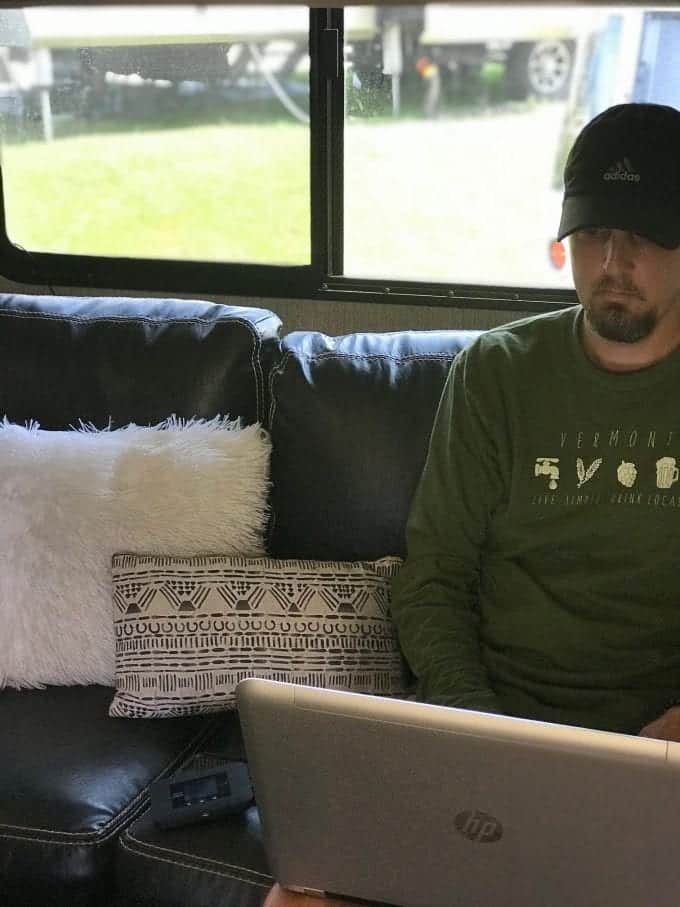
Also, it’s not just us. We also had three kids to think about and we quickly found out that some type of schedule (even if it was a loose one) was important for them as well. It was good for them to know what to expect (and what was expected of them) when they woke up for the day.
For the most part, our days looked like this:
- Todd and I would wake before the kids and work in the silence of the morning
- The kids would wake and do their thing (our oldest son would work on his blog and our videos and our youngest would do school)
- We spent the afternoons and evenings exploring
Did we always follow this schedule? Heck no. We love to hike and quickly found out the best time to do so is very early in the morning. Not only do you beat the crowds, but watching the sunrise on a hike and enjoying the cool morning temps is a pretty magical experience.
4. Have a Plan B (and C and D) When It Comes to Internet Connection
Ah, internet connection.
Todd and I (and the kids too, actually) had such a love/hate relationship with the fact that the first thing we knew we had to do when getting to a new RV park, was check for cell service.
We hated it because it felt so wrong to be driving up to a gorgeous camping spot, let’s say in the Tetons, and focusing on finding a spot with service. Our hearts were telling us this spot was for disconnecting. But our brains told us otherwise.
We loved it because our remote jobs that, yes, required a good cell signal, allowed us the freedom to travel full-time.
Todd went into great detail on the RV internet solutions that allowed us to live in an RV full-time traveling all over the USA and Canada and work while doing so here. He covered our Verizon cell plan, the mobile hotspot product we used, the cell phone signal booster we had and more.
But even with all of those internet solutions, there were times none of them mattered because sometimes internet connection in the spot we were in just wasn’t happening. So we had to have a backup plan.
Some of our backup plans were:
- Working in the RV park lodge and using their WiFi
- Driving until we did have good cell service and working in our truck
- Finding a cafe nearby that had free WiFi
- Leaving the camping spot early if none of those was an option
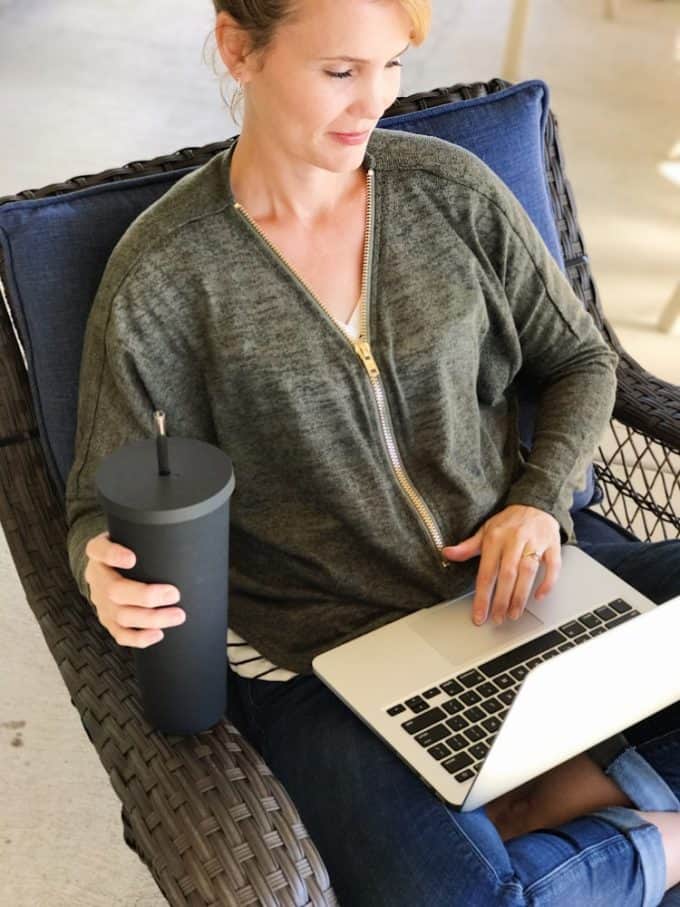
In Yosemite, we worked from our truck on the side of the road.
In Sedona, we worked from our truck in a Walmart parking lot.
In the Tetons, we worked from the laundry/shower facilities that had free WiFi.
In the Florida Keys, our WiFi was so good we could work from the RV (who knew?!)
So what I’m trying to say is…have a plan b, c, and d when it comes to an internet connection!
5. Set Up a Work Space
I have to laugh a little at this tip because this isn’t something we did a good job with for a couple of reasons:
I Didn’t Think I Needed a Work Space
Just like I didn’t think I’d want or need set working hours when we were planning our full-time RV travels, I also didn’t think I’d need a workspace. I definitely pictured a dreamy workspace outside on most days, either while overlooking the ocean or gorgeous mountain peaks.
That dream was quickly squashed by the realities of working outside. Here are several reasons working outside didn’t quite work out:
- Chatty RV Neighbors – it doesn’t matter if you’re sitting outside with your computer looking like you’re working, you will have RV neighbors who will come to talk to you. You have to remember, most people in the RV parks are on vacation and not working.
- The Bugs – sitting outside, in general, wasn’t possible in some places because of the bugs. We remedied that situation by buying an outdoor pop up gazebo tent. It was by far one of our best purchases for allowing us to enjoy outdoor living. But it still didn’t avoid the chatty neighbor issue noted above.
- The Weather – between the heat, the cold, the rain, the wind…you get the idea…it often made working outside difficult.
- The Distractions – I personally found it very difficult to concentrate on work while outside. Between squirrels, people, dogs, and kids asking questions, there were too many distractions for solid work time.
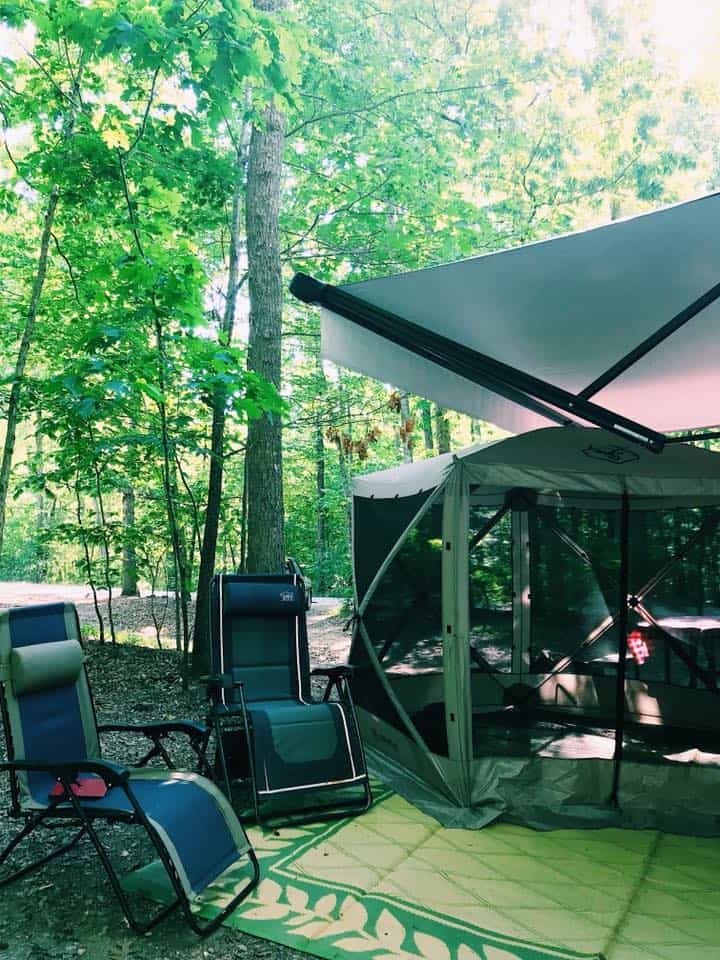
200 Sq. Feet Meant No Space for a Work Space
Given the fact that we were traveling in a 200 sq. ft. travel trailer with four of us (sometimes five), meant there wasn’t any extra room for a workspace.
We didn’t choose our rig for perfect work conditions. We chose it because it made a year of travel and adventure possible for our family, and because we could afford it. If we would have waited for an RV that had an office space for the both of us, we’d still be waiting and you wouldn’t be reading this extremely helpful article. 🙂
So what did we do?
The best we could.
Todd worked from our couch and put his headphones in. Our kids are older, so it was easy for them to understand that when dad had his headphones in, this meant to leave him alone because he was working.
Did it always work? LOL, no. This was definitely not a perfect solution to a workspace, but we made it work because it was what we had.
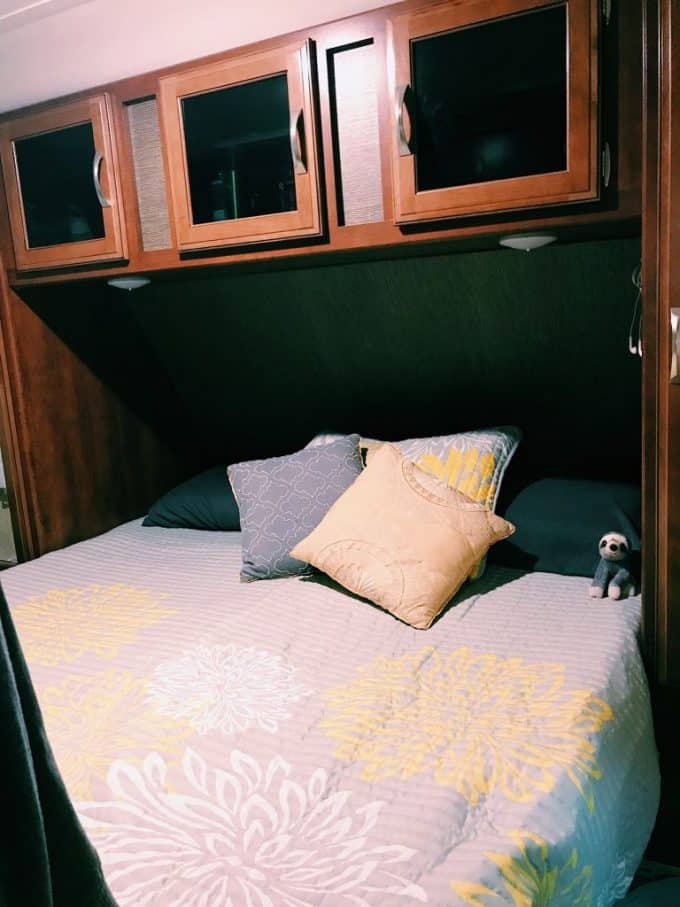
I worked in our bedroom. I set up about three pillows to support my back and had all of my office supplies stashed in an ottoman beside my bed.
Unlike Todd, I could close the doors and get in some good working hours with no distractions. (Sorry, Todd.)
Work With What You Have and Get Creative
If you’re short on space like we were and are sharing an RV with your family, most likely your workspace won’t be anything exciting. But, having a set space, whether that’s the couch or the bedroom, can definitely help. The best thing you can do is work with what you have and communicate with your family about work hours.
You can also see what other full-time RVers have done to create a workspace in their rig. You can also do a simple search on YouTube for RV office space ideas.
Here are a couple of my favorites.
Converting a Dresser in the Bedroom Into a Desk
How We Created Two Workspaces In Our RV (without using the dining room table!)
Working From the Road Is Worth The Challenges
The bottom line is that yes, working while living in an RV full-time is very challenging. You have to get creative. You have to learn to go with the flow. You have meltdowns and then you recover from them. You make do with what you have and embrace the inevitably imperfect solutions.
But despite all of the challenges, it is so very worth it.
During our year and a half traveling full-time, we successfully ran a blog and then sold it. We also launched our new blog, TREKKN and filmed YouTube videos. We started and stopped a business or two and overall, learned what we’re capable of doing despite imperfect circumstances.
If we can ‘balance’ work and living in an RV, so can you. All I can say is that you won’t regret it, despite its challenges. 🙂
PIN THIS
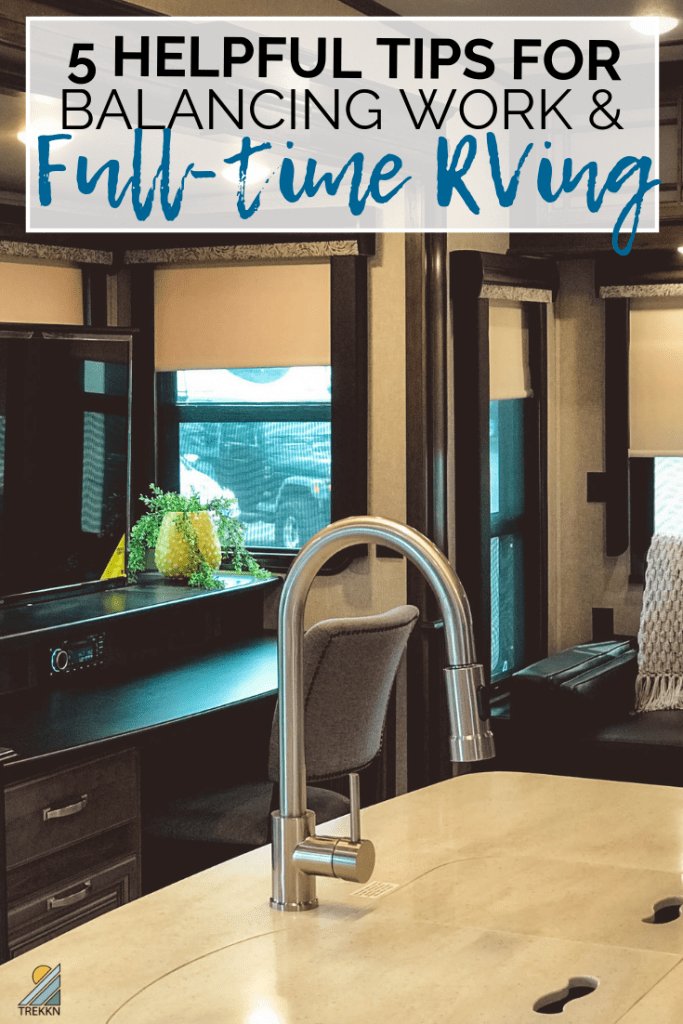

Julie specializes in helping you whip up delicious meals in your tiny RV kitchen, as well as RV organization tips and helping fellow RVers make their RV feel like home. Her favorite RVing spot is in Banff National Park in Canada where yes, the water really is that blue and the people really are that nice.
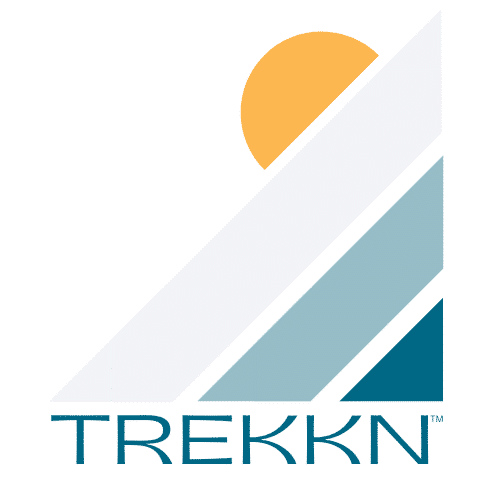

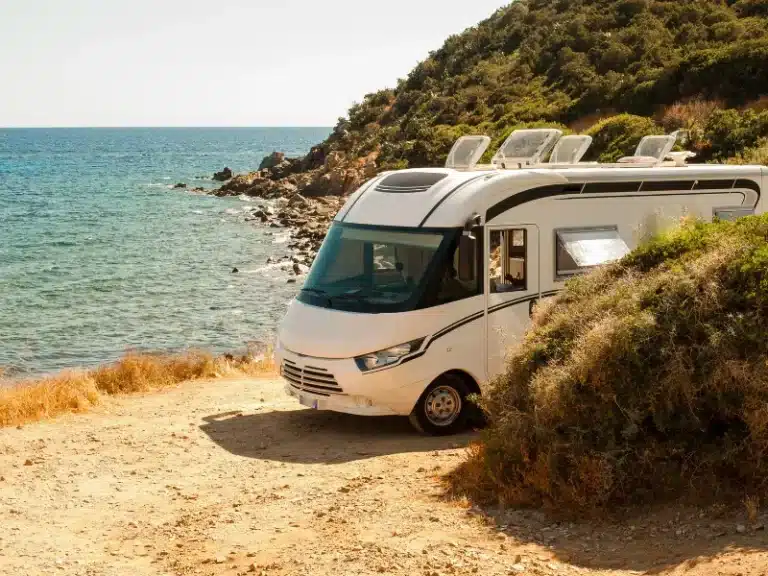
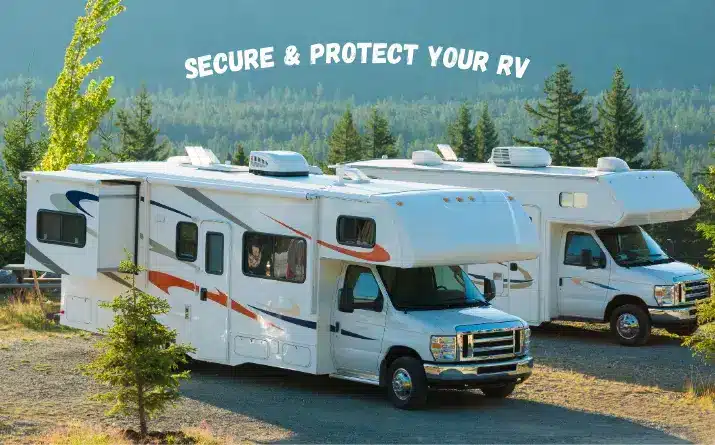
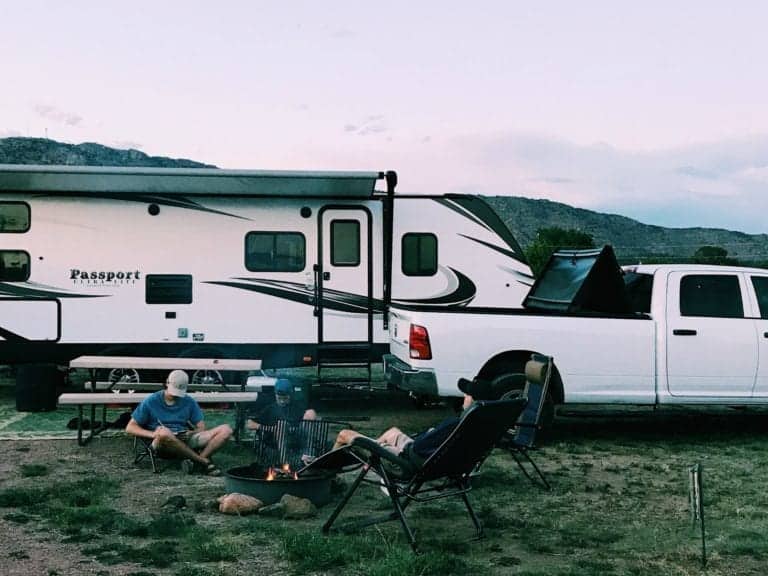


I would love to start a blog and vlog about RV life but really have no idea on how to go about it. I am all over the board but haven’t found anyone to explain step by step of how to get it going. If you could, please help.
Thank you,
Hi Joseph,
Here are a few resources I think might help!
https://www.makingsenseofcents.com/ – Michelle and her husband split their time between RV life and sailing life. She has a great article on the step by step process of starting a blog, plus tons more info on blogging in general.
https://incomeschool.com/ – Jim from Income School, owns http://www.camperreport.com and gives some great real-world examples of how he built up the site. He also has a successful YouTube channel for it.
Also, have you heard of the RV Entrepreneur Facebook group run by full-time RVers Heath & Alyssa? There’s a wealth of knowledge in that group, as well as on their podcast.
I think those would be three good places to start. Let me know if you have any questions about any of these, and good luck!